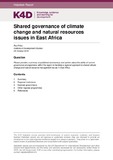Shared Governance of Climate Change and Natural Resources Issues in East Africa
Abstract
This review aims to provide a snapshot of current governance arrangements in the East African region to deal with shared climate change and natural resource management issues. Far from being exhaustive, this review intends to provide a brief overview of the key climate-focused institutions and arrangements for eastern Africa (and sometimes southern Africa as these regional governance arrangements can overlap), with an emphasis on institutions that formulate the regional plans and responses. National responses are also briefly touched upon for some countries and some recent regional donor programmes are explored. Eastern Africa is home to two key regional economic communities (RECs): the Inter-Governmental Authority on Development (IGAD) and the East African Community (EAC), and these are the focus of much of this review. This review used both peer reviewed and grey literature. Issues of gender were not explored. Key findings include: Robust evidence was limited on the success of previous regional programmes and the ability of East Africa to have a shared response in the future. Although the need for a regional response to climate change, in tandem with national responses, was apparent in the majority of the literature. Most African countries have developed national climate-related policies, plans, and actions. ‘Policy coherence’ is widely recognised as necessary for effective climate change responses by governments. However, much of the progress in policy coherence has focussed on vertical integration, aiming to mainstream climate change issues and actions into particular sectors and the different policy levels and scales within them, rather than horizontal, cross-sectoral linkages. Effective legal frameworks are also key for the management of newly discovered extractive resources in east Africa. However, legal frameworks that have emerged after the discoveries of extractives in Kenya, Tanzania and Uganda are not yet well suited to secure effective and democratic governance over natural resources. Furthermore, there are a number of donors, intergovernmental organisations and UN agencies working in East Africa on regional responses to climate change. Programmes include USAID’s Planning for Resilience in East Africa through Policy, Adaptation, Research, and Economic Development (PREPARED) project that ran from 2012 until 2018, and DFID’s current Weather and Climate Information Services for Africa – East Africa (WISER_EA) programme.
Citation
Price, R.A. (2018). Shared governance of climate change and natural resources issues in East Africa. K4D Helpdesk Report 450. Brighton, UK: Institute of Development StudiesIs part of series
K4D Helpdesk Report;450Rights holder
© DFID - Crown copyright 2018.Collections
- K4D [937]

